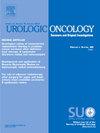自噬失调在低级别和高级别非肌层浸润性膀胱癌中的作用:生存分析与临床病理学关联
IF 2.4
3区 医学
Q3 ONCOLOGY
Urologic Oncology-seminars and Original Investigations
Pub Date : 2024-09-10
DOI:10.1016/j.urolonc.2024.07.017
引用次数: 0
摘要
导言:膀胱癌对男性的影响尤为严重,通常表现为非肌肉浸润性膀胱癌(NMIBC)。尽管接受了初步治疗,但 NMIBC 的复发和进展仍与自噬有关。本研究调查了低度和高度NMIBC中自噬基因(mTOR、ULK1、Beclin1和LC3)的表达情况,为潜在的预后标志物和治疗靶点提供了见解:共收集了 115 份组织样本(n = 85 份 NMIBC(pTa、pT1 和 CIS)和 n = 30 份良性前列腺增生患者的对照样本)。采用定量实时聚合酶链反应和免疫印迹法评估了低度和高度NMIBC以及对照组织样本中自噬基因(mTOR、ULK1、Beclin1和LC3)及其蛋白的表达水平。使用 SPSS 进行多变量和单变量生存分析,分析自噬基因表达与临床病理特征的关系:结果:在高级别 NMIBC 中,ULK1(P = 0.0150)、Beclin1(P = 0.0041)和 LC3(P = 0.0014)被显著下调,而 mTOR(P = 0.0006)被显著上调。KM图显示了自噬基因对生存的显著影响。临床病理特征、高分级(P = 0.019)、肿瘤分期(CIS P = 0.039,pT1 P = 0.018,P = 0.045)、男性(P = 0.010)、淋巴管侵犯(P = 0.028)和自噬基因(ULK1 P = 0.002,beclin1 (P = 0.010,P = 0.022))是NMIBC患者生存结果的相关风险因素:结论:mTOR上调、ULK1下调和beclin1的表达与高分化、CIS和pT1分期有关,导致患者的无复发生存率和无进展生存率较低,凸显了自噬基因在非肌层浸润性膀胱癌中的预后意义。本文章由计算机程序翻译,如有差异,请以英文原文为准。
The role of autophagy dysregulation in low and high-grade nonmuscle invasive bladder cancer: A survival analysis and clinicopathological association
Introduction
Bladder cancer disproportionately affects men and often presents as nonmuscle-invasive bladder cancer (NMIBC). Despite initial treatments, the recurrence and progression of NMIBC are linked to autophagy. This study investigates the expression of autophagy genes (mTOR, ULK1, Beclin1, and LC3) in low and high-grade NMIBC, providing insights into potential prognostic markers and therapeutic targets.
Material and methods
A total of 115 tissue samples (n = 85 NMIBC (pTa, pT1, and CIS) and n = 30 control from BPH patients) were collected. The expression level of autophagy genes (mTOR, ULK1, Beclin1, and LC3) and their proteins were assessed in low and high-grade NMIBC, along with control tissue samples using quantitative real-time polymerase chain reaction and western blotting. Association with clinicopathological characteristics and autophagy gene expression was analyzed by multivariate and univariate survival analysis using SPSS.
Result
In high-grade NMIBC, ULK1, P = 0.0150, Beclin1, P = 0.0041, and LC3, P = 0.0014, were substantially downregulated, whereas mTOR, P = 0.0006, was significantly upregulated. The KM plots show significant survival outcomes with autophagy genes. The clinicopathological characters, high grade (P = 0.019), tumor stage (CIS P = 0.039, pT1 P = 0.018, P = 0.045), male (P = 0.010), lymphovascular invasion (P = 0.028) and autophagy genes (ULK1 P = 0.002, beclin1 (P = 0.010, P = 0.022) were associated as risk factors for survival outcome in NMIBC patients.
Conclusion
The upregulated mTOR, downregulated ULK1, and beclin1 expression is linked to a high-grade, CIS and pT1 stage, resulting in poor recurrence-free survival and progression-free survival and highlights the prognostic significance of autophagy gene in nonmuscle-invasive bladder cancer.
求助全文
通过发布文献求助,成功后即可免费获取论文全文。
去求助
来源期刊
CiteScore
4.80
自引率
3.70%
发文量
297
审稿时长
7.6 weeks
期刊介绍:
Urologic Oncology: Seminars and Original Investigations is the official journal of the Society of Urologic Oncology. The journal publishes practical, timely, and relevant clinical and basic science research articles which address any aspect of urologic oncology. Each issue comprises original research, news and topics, survey articles providing short commentaries on other important articles in the urologic oncology literature, and reviews including an in-depth Seminar examining a specific clinical dilemma. The journal periodically publishes supplement issues devoted to areas of current interest to the urologic oncology community. Articles published are of interest to researchers and the clinicians involved in the practice of urologic oncology including urologists, oncologists, and radiologists.

 求助内容:
求助内容: 应助结果提醒方式:
应助结果提醒方式:


